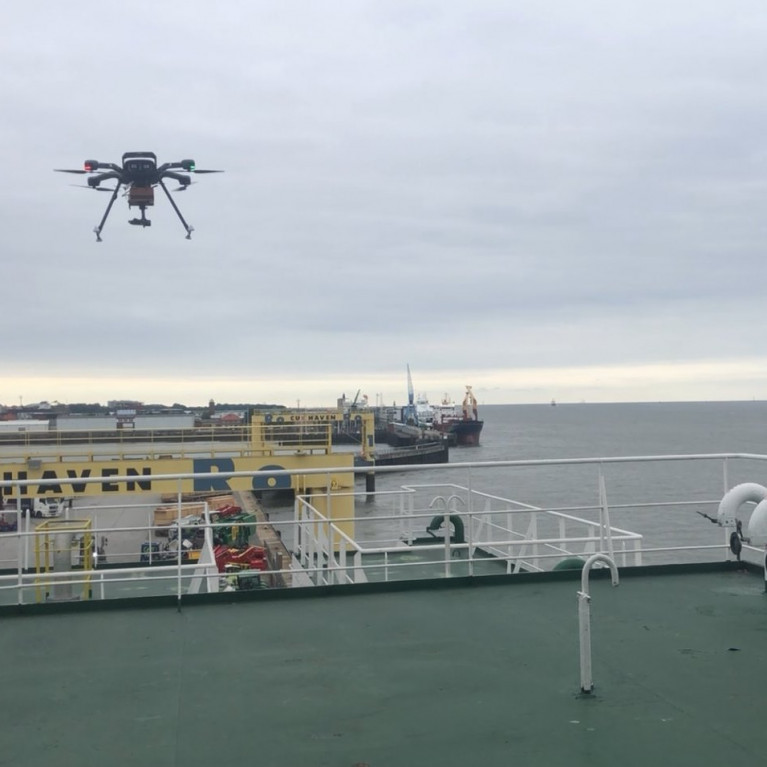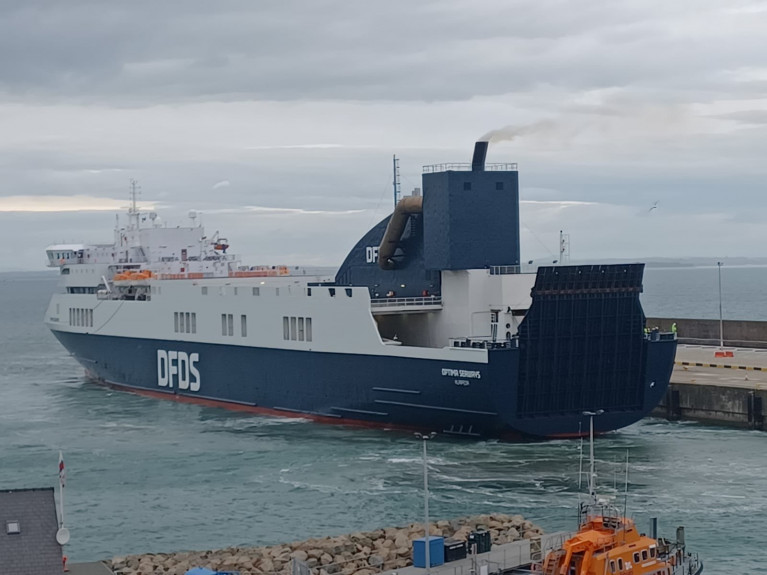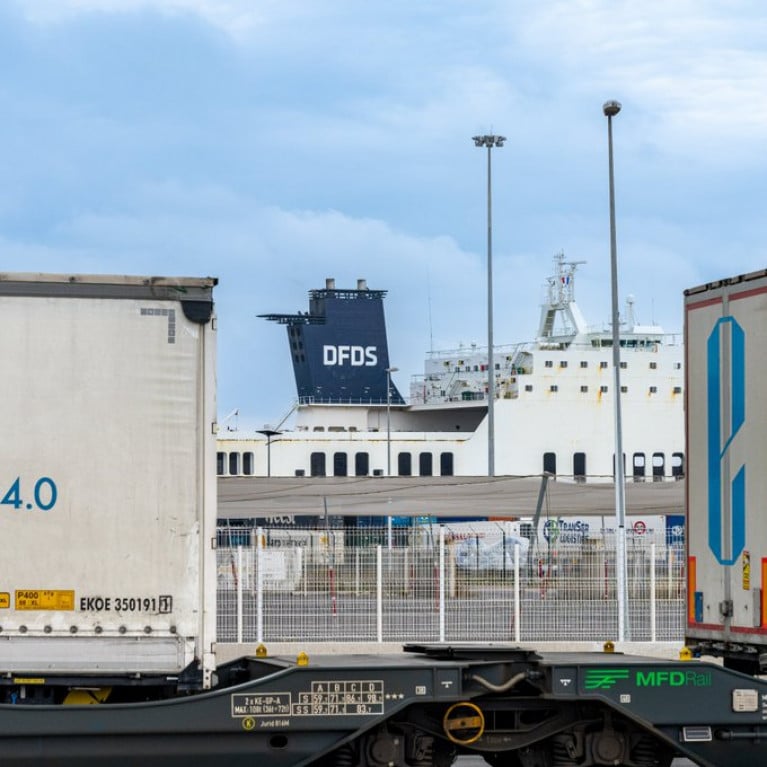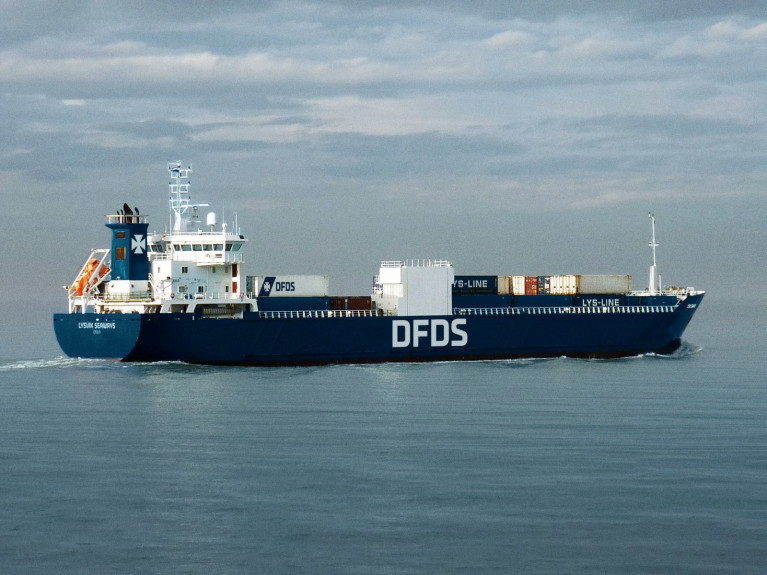Displaying items by tag: DFDS
DFDS Enters Agreement with Incat for Hybrid-Electric Ro-Pax Design Study for Channel Islands Tender
The operator of the Rosslare-Dunkirk route, DFDS, has entered into an agreement with ferry manufacturer Incat Tasmania to conduct a design study for a hybrid-electric ferry intended to be deployed for the Channel Islands if DFDS wins an upcoming tender for future services.
The initiative is a part of the DFDS’ efforts to contribute to the decarbonisation of maritime transport.
DFDS has commissioned Tasmanian ferry manufacturer Incat to conduct a design study for a 72-metre-long hybrid electric ferry with the option of converting it to a fully electric vessel.
The ferry could potentially accommodate both freight and passenger transport and be deployed on routes to and from the Channel Islands and France should DFDS be awarded the upcoming tender for the ferry services on the Islands.
Torben Carlsen, CEO of DFDS, says: “The hybrid electric ferry will be part of our vision for the future ferry solution for the Channel Islands. Electrification of short sea routes is the future, and with the design study, we can fast-track the green transition, ushering in a new era of low-emission maritime transport. This will not be easy. We need to ensure a sufficient power supply on land and infrastructure to accommodate recharging facilities in ports. But I am confident that we can work together with the ports, governments, and communities on the Channel Islands to make this happen”
The framework of the design study will depend on the requirements for the upcoming tender and the needs and wishes of the local communities in Guernsey and Jersey and can be changed to accommodate any new circumstances.
The design study will analyse various specifications, including capacity, propulsion, passenger area layout, etc. In terms of propulsion, DFDS expects to focus on a hybrid solution until sufficient charging infrastructure is available in the relevant ports.
Stena Follows Scandinavian Rival to the Strait of Gibraltar As DFDS Acquired Operator FRS Iberia/Maroc
Stena Line’s recent announcement of acquiring shares in Africa Morocco Link (AML) follows another Scandinavian ferry rival, DFDS, which in January completed the process in its acquisition of a Strait of Gibraltar operator, writes Jehan Ashmore.
It was in September when Danish shipping and logistics company, DFDS announced its acquisition of FRS Iberia/Maroc. The company with a staff of 850, was a division of the German short-sea ferry company, FRS GmbH & Co. KG.
FRS had three routes running across the Strait of Gibraltar, and now DFDS can offer a new market, between Spain-Morocco through these new short-sea ferry routes. They are: Algeciras-Tanger Med, Algeciras-Ceuta, and Tarifa-Tanger Ville. This in a region where growth is expected to be supported by near-shoring of supply chains closer to Europe. In addition annual trade growth of 8% is expected between Europe and Morocco for the next five years.
The acquisition expands DFDS’ Mediterranean route network, currently connecting Europe with Turkey, Asia and Tunisia, Africa respectively.
In November of last year, DFDS passenger-freight ferry, Patria Seaways (formerly, Stena Traveller, the first ferry to serve Stena’s Dublin-Holyhead 'initial freight-only' route in 1995) was chartered by FRS, for an interim deployment on the Algeciras-Tanger Med route. The ferry has returned to this route as part of DFDS new operations between southern Spain and north Africa.
As for the agreement between Stena and AML, this is subject to approval by the Moroccan authorities, where the Tangier based AML operates a ferry route between Tanger Med-Algeciras, Spain. If approved, this would see Stena operate beyond its traditional ferry market in northern Europe by expanding into the Mediterranean Sea.
This summer, AML will also launch a new high-speed route between Tangier Ville and Tarifa. The first route is open for freight and travel customers, whereas the second one, will be a route for passengers and cars.
Afloat also highlights, should the agreement be granted, it will be full circle, as one of AML’s two-ship fleet, is the 1979 Harland & Wolff built Galloway Princess (later Stena Galloway), which serves as AML’s Moroccan Sun along with its fleetmate, Moroccan Star, the 1980 built former Danish State Railways (DSR) Rederei’s Prins Joachim.
The Galloway Princess first served Sealink/British Rail’s North Channel Larne-Stranraer and later Belfast-Cairnryan (under Stena) but ultimately became Stena Galloway following the sale of Sealink British Ferries to Stena Line in 1991. The ferry was the first of a quartet of the 'Saint' Class, but differed in design the most from the rest of the series built for other Sealink routes, including the Strait of Dover.
During its Irish Sea career, Stena Galloway in 1992 also had a stint on the Dun Laoghaire-Holyhead route, as a half-sister, Stena Cambria (ex. St.David) had major engine problems. This led to the North Channel ferry having to cover in on the Ireland-Wales route, supporting Stena Hibernia, and chartered ro-ro freighter Auersberg, owned by German operator DSR Ro Ro.
This trio of vessels on the route was due to a busy high-season coupled with a surge in freight demand, and followed the sale in the previous year of SBF's dedicated freight ferry, St. Cybi on the route.
English Channel: DFDS to Deploy Fleet of Battery Electric Ferries on its Strait of Dover Routes
Ferry operator, DFDS reaffirms commitment to the electrification of English Channel transport after meeting today the UK Minister for Investment and Regulatory Reform, Lord Dominic Johnson.
DFDS's long-term goal is to have up to six battery-powered vessels operating on its (Dover-Calais/Dunkirk) routes on the Channel, with the first two in service by 2030.
The UK Minister for Investment and Regulatory Reform visited DFDS headquarters in Copenhagen, Denmark to discuss decarbonisation of the shipping sector and the electrification of maritime traffic across the English Channel.
DFDS will deploy two battery-powered vessels in the Eastern Channel by 2030. This is a part of a program to invest in six green vessels – two methanol, two ammoniac and two electric – for a total of around DKK 7.3bn over the next six years. The long-term goal is to introduce up to six fully electric vessels on the channel, which would be the world's largest electric ferries.
Because of the relative short distance between the UK and the European continent, the (Strait of Dover) routes on the channel are optimal for electric ferry transport. The English Channel is one of the busiest shipping corridors in the world. It links two of the world’s biggest economies and accounts for 33% of the trade between the EU and the UK.
UK Minister for Investment and Regulatory Reform, Lord Dominic Johnson said: "With its superb infrastructure, technological advances and proximity to Denmark, the UK is the partner of choice for green investments like this. DFDS’ commitment highlights the value of our trading relationship and the strategic importance of the English Channel shipping route. The UK Government remains steadfast in its aim to reach net zero by 2050 and the green transition of the cross-Channel shipping will create British and Danish jobs and strengthen both our economies.”
The green transition of maritime transport on the Channel not only relies on the ships at sea. A sufficient power supply on land and infrastructure to accommodate recharging facilities in ports are equally important to be able to complete the fleet electrification.
“We have a shared ambition with the UK Government to decarbonise maritime traffic across the channel. The transition is not going to be easy. It requires significant investments in innovation, technology and infrastructure, and collaboration and partnerships between the public and private sectors. But I am confident that we will succeed. DFDS will invest in green vessels and cooperate with ports and governments on both sides of the channel to decarbonise cross channel transportation,” says Torben Carlsen, CEO of DFDS.
DFDS has 12 routes connecting UK to France, Germany, The Netherlands, Sweden and Denmark and employs 3,300 people in 5 ports and several logistics offices in the UK, and on board 3 UK flagged vessels.
In addition, Afloat.ie highlights the Danish ferry company, also operates the Rosslare Europort-Dunkirk route linking Ireland and France, their only Ireland-mainland Europe service.
DFDS Expands Ireland-France Passenger Service of Rosslare-Dunkirk Due to High Demand
DFDS direct Ireland-mainland Europe ferry route of Rosslare-Dunkirk, as from today have special deals available to passengers booking in advance for travel in 2024.
The Ireland-France service, offers tourists, with up to 50 cabins available for customers to book on each sailing. There are five passenger departures from Rosslare Europort to Dunkirk each week and the overnight crossing takes just under 24 hours.
Last year Afloat reported of a trial passenger service which was added to freight operations avoiding the UK landbridge, and so the route has become increasingly more popular.
In addition to cabin accommodation, all passenger bookings include meals with freshly cooked breakfast, lunch, and dinner on offer in the self-service restaurant onboard during the journey. For those wishing to stay connected online WiFi is available onboard with a free basic service and premium packages available to purchase for those looking to stream.
Standard prices for a car and four passengers with a cabin start from €400 each way, but a 20 per cent discount is available for customers who book early, providing the opportunity to save on the costs of the journey and spend more on the holiday experience.
The Early Booking Offer applies to standard vehicle and cabin fares on the Rosslare service and is available for all bookings made by 29 February 2024.
Dunkirk is a fantastic arrival port for passengers looking to explore Northern Europe. Disneyland Paris is three-and-a half hours’ drive from the port, while Bruges is just 80 minutes away. We have seen strong demand for passenger crossings on the Rosslare to Dunkirk service since we launched a limited trial in August last year.
Over the summer we offered a full passenger service on the route and with our great value early booking offer we expect to welcome even more customers on board to enjoy the comfortable, relaxing experience we offer. With our straight-forward booking and check-in process, no baggage limits to worry about, and time to relax during the crossing, families can sail into a stress-free holiday by sea.
As Afloat reported in July, the ferry giant DFDS had entered an agreement with Lucey Transport Logistics, Ltd to acquire the company, strengthening DFDS’ logistics offerings in Ireland. On 30 September, the companies completed the acquisition.
“We are excited about the integration of Lucey Transport Logistics into DFDS and to welcome our new colleagues into the DFDS Group,” says Niklas Andersson, EVP and Head of DFDS Logistics.
“The strategic fit between DFDS and Lucey means we will be the leading asset-based logistics provider on the Island of Ireland. With the acquisition, we are creating a full platform of services for customers and connecting them to the expansive DFDS network spanning 21 countries in Europe and Turkey.”
The acquisition is part of DFDS’ growth strategy to develop and expand its network and continue to offer improved solutions to customers.
By combining Lucey’s domestic offering with DFDS’ European route network, the Danish ferry and logistics company will be able to offer Lucey’s existing customers from the FMCG and packaging sectors access to international transport services in an increasingly competitive transportation and logistics market.
Danish shipping and logistics operator DFDS has entered into an agreement to acquire Dublin-based Lucey Transport Logistics.
DFDS is continuing to invest in the Irish market by acquiring 100% of the share capital of Lucey Transport Logistics Limited. This follows DFDS’ opening in early 2021 of the ro-ro (by-pass Brexit) freight ferry route between Rosslare Europort and Dunkirk, France.
The operator will benefit from Lucey’s Irish transport and logistics network, which will strengthen its customer offering in the region. This further strengthens DFDS’ logistics offering and allows DFDS to offer more comprehensive domestic and international solutions.
In addition, by combining Lucey’s domestic offering with DFDS’ European route network, the Danish ferry and logistics company will be able to offer Lucey’s existing customers from the FMCG and packaging sectors access to international transport services.
Executive Vice President and Head of Logistics Division, Niklas Andersson says: "The acquisition of Lucey Transport Logistics Ltd greatly enhances our Irish domestic offerings and complements our existing international solutions. We now offer more comprehensive supply chain solutions in the region underpinned by a network covering the entire island of Ireland."
Kevin Lucey, CEO Lucey Transport Logistics Ltd adds "We are delighted DFDS recognises that Lucey transport Logistics is a highly successful business and a leading provider of logistics services on the Island of Ireland. We are proud of the company’s great family history and our loyal customers and dedicated employees. It gives me great satisfaction to know DFDS will continue to grow and expand the business, providing exciting opportunities for our colleagues, in one of the largest logistics companies in Northern Europe."
Under the terms of the agreement, DFDS will now operate a distribution centre in Dublin and regional depots in key locations across Ireland. In addition, DFDS will take over Lucey Transport Logistics’s substantial trucking operations and their 400 trailers.
The transaction is subject to competition clearance.
DFDS and Upteko have after a year-long collaboration resulted in the ferry and logistics giant being the first in the world to introduce a drone system as part of equipment on commercial ships.
The contract has been signed with the Copenhagen based DFDS which is now implementing the new drone system on freight-ferry Selandia Seaways which Afloat adds operates the North Sea route between Immingham, UK and Cuxhaven (see photo) in Germany.
”Operating our vessels in a safe and efficient manner is crucial in our line of business. With our new drone decision support system, we are pushing the boundaries for how technology can add value in terms of safety and optimisation of operations,” says Rune Keldsen, EVP and Chief Technology Officer.
Eyes in the sky
The drone system is connected to advanced navigation and includes a charging station, lidars, a thermographic sensor and a high definition RGB camera. The drone is flying 120 meters up in the air, live streaming in real-time to the captain on the bridge, using a neural network to post-process the streamed video and calculating the distance between objects around the vessel. The drone will accurately provide the captain with important input acting as the captain's eye in the sky on departure and arrival in the ports and narrow waters.
Today, decisions are based on human observations and GPS, but the drone will in the future function as a decision-support system. The drone system will help optimize operations onboard the ships with its supportive function to the vital human perspective.
Safety is vital
Looking into the future, the drone system will also be able to act as an extra set of hands when a person is in distress or if a fire breaks out onboard the ship. If a person falls overboard, the drone can fly back and locate the person using thermal and ordinary cameras.
Mads Bentzen Billesø, Head of Innovation and Partnerships at DFDS, said “Using drone technology to support operations onboard our ships have been an area we have been investigating with great interest. We are proud of this collaboration which will push large-scale utilization of drones to solve a number of tasks. This will in time result in improved efficiency and, more importantly, improved safety onboard our ferries.”
The development of this new technology has been supported by Danish Maritime Fund and ShippingLab/Innovation Fund Denmark.
Danish operator DFDS has confirmed that a third freight ferry last week joined its Rosslare Europort – Dunkerque fleet as Afloat previously referred, with the first departure from the northern France port on Wednesday 11th May.
The Rosslare – Dunkerque route was inaugurated in 2021 and has been well received by Irish hauliers seeking alternative routes to Europe.
The arrival of Optima Seaways which launched the route in January last year reinforces DFDS’ commitment to this important link between Ireland and France.
Optima Seaways joins Regina Seaways and the (chartered) Visborg on the route.
Optima Seaways has capacity for 2,200 lane metres of freight and will start with one round-trip a week, from Dunkerque on Wednesday at 20:00 hrs and from Rosslare on Saturday at 14:00 hrs.
DFDS Introduce New Rail Freight Service from Calais to Séte on Mediterranean Sea to Link Turkey
DFDS the operator of the Rosslare Europort-Dunkirk freight ferry route, has announced that they are introducing a new rail freight service from Calais to Séte which starts today.
The new rail service connects London with Yalova in Turkey, will shorten transport time between London and Istanbul.
The new line means that DFDS will be able to offer a full complement of rail and sea transport between London and Istanbul, with a transit time of just 7 days, making it the fastest route there is between the UK and Turkey.
The new route expands DFDS’s existing network of services between the UK and Europe and comes in response to growing demand.
Lars Hoffmann, Head of DFDS’s Mediterranean Business Unit said: “We’re delighted to be adding a new rail line service to improve connections and shorten transport time between the UK and Turkey.
“It aligns with our business strategy to grow and expand the extensive route network that DFDS already offers, helping our customers, communities – and our own business of course – to grow.
“By combining our ferry activities in the Mediterranean and the UK with a new rail service, we’re able to offer by far the fastest connection between London and Istanbul. It’s a sign of confidence in the popularity of our offerings and a strong indication of our commitment to our customers.”
The service will run twice a week, with two weekly departures in each direction between Calais and Séte.
This is the latest in a series of investments that DFDS is making to improve its service; as an unaccompanied freight service from Sheerness to Calais was opened last year. The route can carry over 100 trailers or containers per sailing.
Since the launch of the UK-France route, Afloat adds London Medway port reported a record month in trading unccompanied trailer-units.
DFDS Sale Container/Sideport Ships But Leased Back to Continue Nordic-UK-Europe Service
Danish shipping operator DFDS which operates the Rosslare-Dunkirk 'Brexit-Bypass' ferry route has entered into sale and lease-back agreements for two container/sideport loading ships, writes Jehan Ashmore.
The deal took place last month between DFDS and the Finnish shipping firm Godby Shipping A.B. based in Mariehamnm, the capital of the Åland Islands located in the Baltic Sea.
The two ships involved are the Norwegian flagged pair Lysvik Seaways (1997) and Lysbris Seaways (1998) which will continue to be deployed on routes between the Nordic state, the UK and the European continent mainly carrying containers and industrial paper products.
The agreement also includes options to extend the charters beyond 2024.
Lysvik/ Lysbris Seaways main characteristics:
Loa 129 m
Beam 18 m
Dwt 7.500 ton
Speed 16 knots
Wärtsilä 46C 6.300 kW main engine
DNV +1A1 E0 Ice(C) TMON
Afloat tracked the Lysvik Seaways which had been in Ijmuiden and is currently at the Port of Amsterdam. While off Norway, Lysbris Seaways (see Dutch port related 'sail' story) is en-route from Bergen and the UK port of Sheerness in Kent.
Also tracked by Afloat back in 2019 was Lysvik Seaways which was due to Belfast Harbour when operating between Norway and the UK.
A year later Godby Shipping A.B. also had links with the Irish Sea as they had chartered the ro-ro freighter Misida to P&O Ferries route of Dublin-Liverpool.
































































